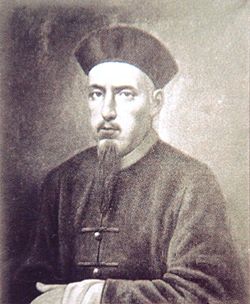Auguste Chapdelaine
| Saint Auguste Chapdelaine | |
|---|---|

Auguste Chapdelaine. Martyred in China in 1856.
|
|
| Catholic martyr | |
| Born | January 6, 1814 |
| Died | 29 February 1856 (aged 42) |
| Canonized | 1 October 2000 by John-Paul II |
Father Auguste Chapdelaine (Chinese name: Ma Lai 馬賴) (6 February 1814 – 29 February 1856) was a French Christian missionary of the Paris Foreign Missions Society.
Chapdelaine was born in La Rochelle-Normande, France. He left France in 1852 to join the Catholic mission in the Guangxi province of China. After a stay in Guangzhou, he moved to Guiyang, capital of the Guizhou province, in the spring of 1854. In December, he went, together with Lu Tingmei, to Yaoshan village, Xilin County of Guangxi, where he met the local Catholic community of around 300 people. He celebrated his first mass there on 8 December 1854. He was arrested and thrown into the Xilin county prison ten days after his arrival, and was released after sixteen or eighteen days of captivity.
Following personal threats, he went back to Guizhou in early 1855, and came back to Guangxi in December of the same year. He was denounced on February 22, 1856, by Bai San, a relative of a new convert, while the local tribunal was on holiday. He was arrested in Yaoshan, together with other Chinese Catholics, by orders of Zhang Mingfeng, the new local mandarin on 25 February 1856. He was severely beaten and locked into a small iron cage, which was hung at the gate of the jail. He was already dead when he was beheaded.
His death was reported by the head of the French missions in Hong Kong on 12 July. The chargé d'affaires, de Courcy, in Macao learned of the murder on 17 July, and filed a vigorous protest on 25 July to the Chinese Imperial Viceroy Ye Mingchen.
La captivité de M. Chapdelaine, les tortures qu'il a subies, sa mort cruelle, les violences qu'on a faites à son cadavre, constituent, noble Commissaire Impérial, une flagrante et odieuse violation des engagements solennels qu'il a consacrés. Votre Gouvernement doit donc une éclatante réparation à la France . Vous n'hésiterez pas à me l'accorder pleine et entière. C'est à V. E. qu'il appartient naturellement d'en proposer les termes; j'aurai à décider ensuite si l'honneur, la dignité et les interêts du Gouvernement de mon grand Empereur me permettent de les accepter. Mon désir serait d'ailleurs de me rendre à Canton et d'en conférer de vive voix avec V. E. Elle n'ignore pas qu'une heure de conversations amicales avance plus quelquefois la solution des affaires importantes qu'un mois de correspondances écrites
...
Wikipedia
